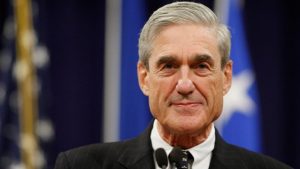"Mr. Weissmann, when did you stop violating the civil rights of members of the Trump campaign?"
That might be the first question Attorney General Barr could ask Andrew Weissmann if given the chance to inquire about his role as "Mueller's Pit Bull" in the Special Counsel's Office.
Andrew Weissmann is a relative newcomer to Twitter, only signing on recently after the end of his government service and when he became a faculty member at NYU Law School. His contributions via Twitter are 100% anti-Trump and anti-Barr. They go hand-in-hand with his email to Sally Yates after she was fired by Trump for refusing to enforce his Executive Order prohibiting travel into the US from certain countries deemed to be state sponsors of terrorism. Weissmann wrote to her "I am so proud," "And in awe. Thank you so much."
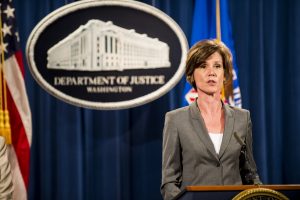 Deputy Attorney General Sally Q. Yates speaks during a press conference at the Department of Justice.
Deputy Attorney General Sally Q. Yates speaks during a press conference at the Department of Justice.
Those two bookends -- his Yates’ email and current Twitter activities -- establish beyond a doubt that Weissmann was an Anti-Trump ideologue during his time as a senior member of Robert Mueller's Special Counsel Office (SCO). He has made no effort to hide his bias, and I do not accept for a single moment any claim that he navigated his duties with the SCO in a fair and impartial manner. Andrew Weissmann had one goal in mind, finding a way to indict or otherwise drive Donald Trump from office.
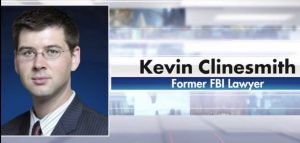 In that regard, he had an ally. Kevin Clinesmith was a member of the FBI Office of General Counsel, assigned to the National Security and Cyberlaw Branch. Clinesmith was assigned by the FBI as the primary “legal advisor” to “Operation Crossfire Hurricane” (CH).
In that regard, he had an ally. Kevin Clinesmith was a member of the FBI Office of General Counsel, assigned to the National Security and Cyberlaw Branch. Clinesmith was assigned by the FBI as the primary “legal advisor” to “Operation Crossfire Hurricane” (CH).
Kevin Clinesmith pled guilty to a single count “Information” charging him with having “made or used a false writing” in connection with a federal investigation.
On June 19, 2017, Clinesmith altered the wording of an email received by him from another intelligence agency and then forwarded the altered email to a “Supervisory Special Agent” (SSA) of the FBI. The changes made by Clinesmith resulted in the SSA’s mistaken belief regarding Carter Page’s status with that other agency, and as a result, the SSA’s affidavit to the Foreign Intelligence Surveillance Court was inaccurate due to Clinesmith’s alteration.
There are several corollary issues tied up in this episode, and I’ll deal with those further down in this story.
But I first want to address some wild and uninformed speculation about the status of Clinesmith vis-à-vis the ongoing investigations initiated by Attorney General Barr into various aspects of the origins of CH and all that came after. I don’t have any first-hand information, but I have 22+ years’ experience doing exactly what it is the Durham investigation has likely just done.
A federal prosecutor does not file an “Information” without first having in place three things: 1) an agreement by the defendant to waive indictment; 2) an agreement as to the specific crime the defendant will plead guilty to, and 3) an agreement as to the factual basis the defendant will admit to in order to support the guilty plea.
Those three items are agreed to in advance and are generally the result of extensive conversations and negotiations between the defendant’s attorney and the prosecutor.
The prosecutor NEVER enters into that agreement unless he/she is certain as to the full scope of potential criminality in which the defendant was involved. That means the defendant has sat down with the case agent/prosecutor and answered every question put to him. Those questions are not limited to just the incident to which the defendant will later plead guilty. The questions go back to the beginning, and the defendant who is hoping for the best possible outcome will, in almost all instances, answer every question, especially when he has no meaningful defense to the most obvious charge and the prosecutor has the keys to the jail cell in his hand.
Kevin Clinesmith does not think he was involved in a “criminal” enterprise that targeted Donald Trump, the Trump Campaign, or anyone else. Clinesmith knows he did something wrong, but Clinesmith sees everything that went on during CH as a legitimate federal counter-intelligence investigation. For that reason, Clinesmith has no reluctance to answer all the questions John Durham’s investigators have for him because there is nothing to hide from his perspective. He does not see anything fundamentally improper – much less illegal – about what Operation CH was attempting to uncover.
But Clinesmith doesn’t know everything that John Durham’s investigators know. And John Durham’s investigators might not have solid evidence for things that Clinesmith does know -- what was said behind closed doors by certain individuals directing the investigation, both before and after the SCO took over the case.
Clinesmith’s value in the form of “cooperation” is not what most people seem to believe “cooperation” must consist of.
 Former US National Security Advisor General Michael Flynn
Former US National Security Advisor General Michael Flynn
Durham was not going to have Clinesmith arrange to have lunch with Andrew Weissmann, and then send him in carrying a digital recording device and instructions to get Weissmann to discuss all the fun times they had figuring out how to entrap General Flynn.
From Clinesmith, the “cooperation” Durham sought was likely nothing more than information. Clinesmith is a “pair of ears” that John Durham otherwise doesn’t have. He’s someone who was a “body in the room” when others were talking, making decisions, and giving directions. Clinesmith wasn’t a person giving directions, but he was one of the guys who was told what to do by the Andrew Weissmann's and Jeannie Rhee's of the SCO – after he was one of the guys told what to do by the Peter Strzoks and Andy McCabes of the FBI.
Why – other than the obvious reasons – is this fact of importance to investigations started by AG Barr, including the Durham investigation? Well, that requires a bit a “Lawsplainer” on what is known as a “federal criminal conspiracy.”
Generally speaking, a “criminal conspiracy” is an agreement by two or more people to commit one or more crimes, combined with an overt act taken by one or more conspirators “in furtherance” of carrying out the purpose of that agreement.
But for purposes of understanding the importance of Clinesmith to Durham (and others), the most significant factor to understand is the question of “how” a prosecutor builds and proves a conspiracy case.
Complicating Durham’s investigation is the fact that the various actors involved will all profess they were simply conducting a criminal investigation. They will claim that all the actions taken by them in the course of conducting that investigation were legitimate law enforcement inquiries.
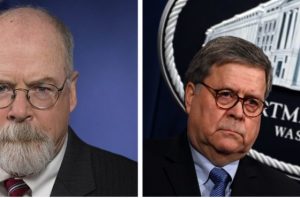 Durham needs someone who tells the same story the targets would tell, but maybe tells it in a way that is not so “self-serving.” This is where the evidentiary rules for “proving” a conspiracy come into play.
Durham needs someone who tells the same story the targets would tell, but maybe tells it in a way that is not so “self-serving.” This is where the evidentiary rules for “proving” a conspiracy come into play.
First, the “agreement” between two or more persons to commit one or more crimes does not need to be an “express” agreement. It is not necessary for the evidence to be that the co-conspirators talked about the crime then intended to commit, and then verbalized – or memorialized in a writing – an agreement to commit that crime. A typical “Jury Instruction” in federal court on the crime of conspiracy includes some form of the following language:
For a conspiracy to have existed, it is not necessary that the conspirators made a formal agreement or that they agreed on every detail of the conspiracy.
One becomes a member of a conspiracy by willfully participating in the unlawful plan with the intent to advance or further some object or purpose of the conspiracy, even though the person does not have full knowledge of all the details of the conspiracy.
An overt act does not itself have to be unlawful. A lawful act may be an element of a conspiracy if it was done for the purpose of carrying out the conspiracy. The government is not required to prove that the defendant personally did one of the overt acts.
Against the backdrop of what a jury would be told, there are many, many appellate court decisions on the subject, which have some form of the following comment:
“An agreement to commit a crime can be explicit or tacit, and can be proved by direct or circumstantial evidence, including inferences from circumstantial evidence.”
THAT is why Kevin Clinesmith is of value to an investigation. It is highly unlikely that Durham or any other prosecutor going back through the CH investigation is going to find overt or direct evidence that any of the participants entered into an explicit agreement to violate a federal statute. But in many instances, that is not the method by which the existence of a conspiracy is proven in a federal criminal trial.
Concerted actions, circumstantial evidence, and inferences that can be drawn therefrom are the foundations upon which federal criminal conspiracies are often proven.
What about “intent” to commit a crime a reader might ask? Again, the law recognizes that “intent” is a matter of what was in the defendant’s mind at the time the action was taken and is not subject to “direct” evidence unless the defendant confesses. So “intent” is most often established by circumstantial evidence and the reasonable “inferences” that can be drawn from such evidence.
That takes us back again to what Clinesmith can tell Durham about what he heard from others, and what he saw while working on CH. All of that is potentially “circumstantial evidence” that could support a “concerted action” or “tacit agreement” approach to proving the existence of a “conspiratorial agreement.”
When you look at the history of the investigation, and Clinesmith’s function and role over time, you see the potential for Clinesmith to have been a wealth of information – much greater than if you just focused on his job function.
The CH investigation was originally based out of FBI HQ as was explained by the Inspector General’s Report on Four FISAs.
“[Counterintelligence Division-CD] officials originally decided to conduct the investigation out of FBI Headquarters … rather than out of one or more field offices, which is more typical. The original team … from multiple field offices who were assigned to Headquarters for 90-day temporary duty assignments (TDYs).”
Clinesmith was stationed in FBI HQ – he did not need to be assigned to CH from another location. Although not technically an “agent” or an “analyst”, Clinesmith was a “professional support staff member” assigned to work with the CH team. Clinesmith was involved in many aspects of the investigation as it developed from the beginning.
Because he was normally assigned to FBI HQ, Clinesmith remained a “constant” in the investigation even as other team members rotated back to their normal assignments. As the IG noted:
Following the November 2016 U.S. elections, the 90-day TDY assignments ended…. CD reorganized the structure of the Crossfire Hurricane investigation by transferring the day-to-day operations of the four individual investigations to three field offices, and dividing oversight of the investigations between two operational branches at FBI Headquarters…
 Peter Strzok, having overall supervision of CH was at FBI HQ, and Clinesmith was at FBI HQ. Clinesmith was a “constant” because he didn’t come to CH from another field office, and he remained working on CH when the four components were shifted to Field Offices with oversight of the investigations in FBI HQ. But there was then a third iteration of staffing as noted by the IG:
Peter Strzok, having overall supervision of CH was at FBI HQ, and Clinesmith was at FBI HQ. Clinesmith was a “constant” because he didn’t come to CH from another field office, and he remained working on CH when the four components were shifted to Field Offices with oversight of the investigations in FBI HQ. But there was then a third iteration of staffing as noted by the IG:
In April 2017, CD again reorganized the Crossfire Hurricane investigation by restructuring the day-to-day operations of the cases back at FBI Headquarters to recentralize the case…. to restructure the investigation at Headquarters and to impose greater structure on the team's investigative and analytical efforts.
As of April 2017, CH was back being run out of FBI HQ, and Clinesmith remained with the investigation – now in its 9th month.
In May 2017, Robert Mueller was named SCO, and he brought in approximately 17 current or former DOJ prosecutors to take over leading the various elements of CH. Once again, Clinesmith stayed with CH while other FBI personnel assigned went back to the regular assignments, and new agents and analysts joined through the Special Counsels Office.
Clinesmith, like Strzok and maybe only a small handful of others, was involved for nearly the entirety of the “Russian Hoax” aspect of the investigation. Clinesmith has added value to Durham by virtue of the fact that he was involved for the first 8 months of the SCO’s handling of the investigation, not being kicked out until February 2018 when his text messages and emails were revealed to the SCO by the IG. Strzok was taken off the investigation in Aug. 2017, only 60 days after the SCO got started.
Clinesmith was with CH from “Day 1”, and lasted 8 months with the SCO before he too was removed in February 2018. Combined, Clinesmith was on the CH investigation for 20 months. That is a lot of ground to cover, and likely involved a lot of meetings where he sat in on or participated in the discussions.
But let me also address the “centrality” of Clinesmith to the actual “decision-making” on CH investigative decisions.
I have said on Twitter and in other writings that I do not believe that Clinesmith had leadership or otherwise significant operational role in how CH was pursued. That just wasn’t his function, and it reflects a misunderstanding of the role of FBI “General Counsel’s Office” attorneys and where they fall in the “food chain.”
 Clinesmith was assigned to the “National Security and Cyberlaw Branch” of the General Counsel’s Office. That places his functions within the “intelligence” side of the Bureau’s activities and relates primarily to their evidence and information gathering authorities and techniques.
Clinesmith was assigned to the “National Security and Cyberlaw Branch” of the General Counsel’s Office. That places his functions within the “intelligence” side of the Bureau’s activities and relates primarily to their evidence and information gathering authorities and techniques.
Between a “National Security Letter” which is akin to an “Administrative Subpoena”, and a FISA Warrant, there is a range of intermediate intelligence-gathering methods and techniques that can be employed depending on circumstances.
The kinds of authorities and techniques on counter-intelligence matters are different than what the FBI would use on criminal investigations. When they have questions involving criminal matters, they generally will call the AUSA assigned to the investigation – or some other AUSA they know – and get advice/answers.
But DOJ does not have a robust staff of prosecutors or other attorneys who handle “intelligence” matters because “intelligence” matters do not normally end up in prosecutions. So, the FBI’s “legal expertise” on those subjects is in-house – people like Clinesmith. They are there to answer questions about what agents can do consistent with their lawful authorities in terms of gathering information through a variety of techniques that likely violate the Fourth Amendment.
Being able to provide that advice does not make the OGC lawyer an “investigator” or “analyst” in the investigation. He is a resource to get advice and answer legal questions unique to counter-intelligence matters. The idea that because he has the important-sounding title of “Office of General Counsel Attorney” it means he had some key operational responsibility in decision-making misunderstands the position.
Since he was on the ground at the beginning of CH in August 2016, and knowing that the details of the investigation and operations underway were “closely held,” he was likely privy to the thinking of those involved in those early days when everyone was animated by a “WTF?” attitude when it came to the allegations involving Candidate Trump and Russia.
 Christopher Steele, former British intelligence officer
Christopher Steele, former British intelligence officer
The early days of CH are where a lot of corners were cut, including the eventual reliance on the Steele “dossier” which the FBI could not itself verify. All they had was Steele’s word that his sourcing was solid, and the allegations of the “dossier” were based in fact. Discussions among the FBI team on how to deal with Steele’s information – and how to describe Steele to the FISC – would be very interesting to Durham and his investigators since we know that a decent amount of obfuscation was employed in the initial application. Whose idea was that and why?
Beyond their self-professed justifications, Clinesmith can describe any conversations he might have been involved with in real-time, which may be at odds with the publicly stated justifications.
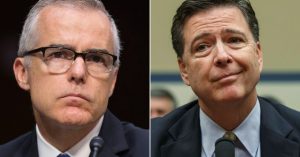 I doubt that McCabe or Comey talked to Clinesmith directly, but Clinesmith likely spoke with others who were privy to conversations about what McCabe and Comey had said to others.
I doubt that McCabe or Comey talked to Clinesmith directly, but Clinesmith likely spoke with others who were privy to conversations about what McCabe and Comey had said to others.
In the aftermath of the election, we know there was a significant amount of “panic” and “angst” among some in the FBI working on CH over what the fallout might be once the new Trump Administration was running DOJ. It’s likely that Clinesmith had many conversations that were of a similar nature to the text message exchanges and emails he was involved with. What sentiments were expressed by others – especially those who were in positions of being decision-makers on CH? These conversations could include statements or comments that might amount to “consciousness of guilt” by the speakers.
Durham knows that in the weeks following the inauguration, more and more evidence began to mount that the Steele dossier allegations were baseless, and the investigative steps taken in reliance on them were all unsound. Yet the FBI and DOJ officials in place in April 2017 still used the allegations as a basis to seek the second extension of the Page FISA. Was Clinesmith involved in discussions on that decision? How was it justified? What was the view on Steele’s claims, especially in light of what was learned by then from the interview(s) with Steele’s “Primary Sub-Source”?
Next for Durham – or maybe another investigation as I have surmised – is what Clinesmith learned when he remained assigned to the investigation after the Mueller appointment. A critical issue there involves Mueller’s hiring of 17 SCO prosecutors, and their first order of business after the SCO took over the CH investigation.
Those prosecutors, and any newly assigned investigators, would have looked at the FBI personnel who had been on CH before the SCO, and then stayed on the case assigned to the SCO, as the “institutional history” of what had happened between July 2016 and May 2017. The SCO did not begin CH over again from scratch, they picked up the investigation at the point it was assigned to the SCO, and Clinesmith would have been central in bringing the SCO lawyers up to speed on what had been done up to that point in time.
Based on my experience, and given my point of view about the role played by FBI OGC attorneys, I do not believe the SCO prosecutors would have given Clinesmith any significant responsibility in an operational respect. Remember, the SCO was the “All-Star” team handpicked by Mueller. Clinesmith’s role was to advise the FBI agents about how they could lawfully go about their investigative steps, not what steps they should take, and why. That was the province of the prosecutors.
But – and this is key - the fact that he is a clear Democrat partisan with an overt anti-Trump bias would have made him ideologically “sympatico” with the partisans like Weissman and Rhee that Mueller brought in. As part of his bringing the SCO lawyers up to speed, it would have all been spewed forth by him as a “true believer” in the wildest Trump-Russia conspiracy theories that drove CH up to that point.
What Weissman fears is that Clinesmith can tell Durham what was said to him by the SCO prosecutors. Durham now has a first-person account into the machinations of the SCO in the crucial first few weeks and months when the thinking and planning were taking place with respect to digging out the evidence to prove the Trump-Russia collusion that they were convinced had to exist.
What did Clinesmith tell them about problems that had developed with the sourcing behind the allegations in Steel’s memos? The third Page FISA extension took place on the SCO’s watch? Did members of the SCO play a substantive role in approving the application for the third extension? How much did they know about the problems? Did anyone offer a rationalization for pressing forward with the third extension? Did anyone voice an objection, privately or publicly?
The same pattern of questions can be put to Clinesmith about every aspect of his involvement in the continuing investigation during the eight months he worked with the SCO.
A prosecutor establishes inferences of “intent” behind explanations offered about why certain actions were taken and other actions were not. You establish the existence of a “tacit” agreement through showing concerted actions all leading in one direction and with a single purpose or goal.
Kevin Clinesmith – and maybe others – give those conducting Barr’s investigations live witnesses to the decisions that were made and the motives for making them. It’s up to the prosecutor to then weave those together to lead to certain unavoidable conclusions.
Someone – or more than one – with the SCO decided it was necessary to try and erect a firewall between themselves and Kevin Clinesmith, as they clearly understood his vulnerability once William Barr was appointed Attorney General, given what they knew the IG report on Four FISAs would disclose about Clinesmith and the altered email. They knew he was going to be prosecuted for altering the email. They knew the Page FISA had been illegitimate going back to the original application. They knew Barr would run that subject to ground, and Clinesmith would be compelled to talk.
So, what did they do? They inserted a passage and footnote into the Mueller Report which basically said, “Clinesmith didn’t work for us.” At page 13 of the Report, there is the following information about how the SCO Investigation was staffed: (emphasis mine)
The Special Counsel attorneys and support staff were co-located with and worked alongside approximately 40 FBI agents, intelligence analysts, forensic accountants, a paralegal, and professional staff assigned by the FBI to assist the Special Counsel’s investigation. Those “assigned” FBI employees remained under FBI supervision at all times; the matters on which they assisted were supervised by the Special Counsel. (FN1)
Footnote 1 referenced there read as follows:
-
- FBI personnel assigned to the Special Counsel’s Office were required to adhere to all applicable federal law and all Department and FBI regulations, guidelines, and policies. An FBI attorney worked on FBI-related matters for the Office, such as FBI compliance with all FBI policies and procedures, including the FBI’s Domestic Investigations and Operations Guide (DIOG). That FBI attorney worked under FBI legal supervision, not the Special Counsel’s supervision.
The FBI Attorney being referred to was Kevin Clinesmith.
“He didn’t work for us.” I can hear Andrew Weissmann’s voice calling out those words. The SCO is desperate to not be held accountable for Clinesmith’s actions, and they created a barrier behind which they are going to claim that any insights he offers to Durham or anyone else about the SCO are invalid because he wasn’t “on the inside” of what was happening.
What I’ve tried to set forth here is NOT A PREDICTION. It might turn out that Durham or others come to the conclusion that there is insufficient evidence to charge anyone with a conspiracy or other crime. I have not covered here what crimes might have been the subject of a conspiracy – I’m writing another article on that topic.
But it is important to understand that any charged “conspiracy” must relate to the intention to commit some identifiable crime. All I’ve tried to show with this article is how, on a theoretical level, forcing Clinesmith to plead guilty produces the cooperation that can assist the broader investigation in ways that even Clinesmith might not realize.
There is no need for a “cooperation” agreement unless some additional benefit was going to be bestowed upon Clinesmith. It’s not necessary in order to obtain his testimony before a grand jury or trial – a subpoena accomplishes that. “Cooperation” from him was always about historical recollection. He gave that. There would have been no “Information” filed without it. Whether it helped to build a prosecutable case is what we are all waiting to hear.
Shipwreckedcrew has 22 years as federal prosecutor; six years in private practice. Follow on Twitter @shipwreckedcrew



